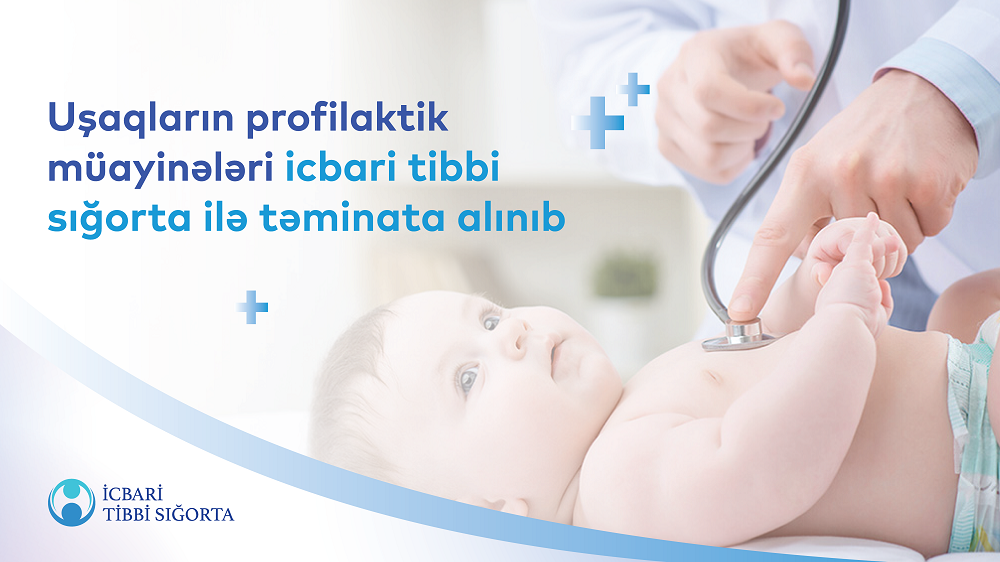19 May 2023 10:13
Uşaqların profilaktik müayinələri icbari tibbi sığorta ilə təminata alınıb
İcbari tibbi sığortanın Xidmətlər Zərfi ilə təminata alınan profilaktik tibbi müayinələrə uşaqların icbari dispanserizasiyası və uşaqların ağız boşluğunun mütəmadi müayinəsi daxildir. İlkin tibbi-sanitariya yardımı üzrə müayinələr uşaqların qeydiyyatda olduqları poliklinika və ya ailə sağlamlıq mərkəzlərində ödənişsiz aparılır. Profilaktik müayinələr uşaqların sağlamlıqlarının vaxtaşırı yoxlanılması, yarana biləcək xəstəliklərin erkən aşkarlanması, vaxtında müalicəyə cəlb olunmasına və xəstəlik inkişaf etmədən qarşısının alınmasına xidmət edir.
18 yaşadək uşaqların icbari dispanserizasiyası
İcbari dispanserizasiya uşaqların yaşı və sağlamlıq vəziyyəti nəzərə alınaraq təsdiq edilmiş müayinə cədvəlinə əsasən həyata keçirilir. 3 yaşa qədər uşaqlarda müayinələr il ərzində bir neçə dəfə, 3 yaşdan 18 yaşadək uşaqlarda isə ildə bir dəfə aparılır. Qeyd etməliyik ki, 3 yaşlı uşaqların həkim-pediatr tərəfindən müayinəsi 6 aydan bir həyata keçirilir.
Uşaqların müayinəsi həkim-pediatr, oftalmoloq, otorinolarinqoloq (LOR həkimi), həkim-nevropatoloq, loqoped və stomatoloqlar tərəfindən aparılır. Profilaktik müayinələr zamanı uşaqların müxtəlif orqan və sistemlərinin, xüsusilə sinir sisteminin, çəkinin dinamikası və anadangəlmə inkişaf qüsurlarının aşkarlanması, danışıq, qamət, eşitmə, görmə, qulaq, burun, boğaz orqanlarının yoxlanılması, uşağın fiziki və psixi inkişafına nəzarət və digər tibbi xidmətlər göstərilir.
Müayinə zamanı ehtiyac yaranarsa, müvafiq ixtisas həkiminə əlavə müayinə-müalicə üçün göndərişlər verilir. Uşaqlar dispanserizasiya müayinəsinə həkimin çağırışı ilə gətirilir. Uşaqların tibb müəssisəsinə gətirilməsinə və dispanserizasiya ilə əlaqədar tibb işçilərinin göstərişlərinin yerinə yetirilməsinə görə məsuliyyəti onların valideynləri və digər qanuni nümayəndələri daşıyırlar.
Uşaqların ağız boşluğunun mütəmadi müayinəsi
Erkən yaş dövründə ağız boşluğunun sanasiyası (müayinəsi) uşaqların ağız boşluğunun gigiyenasını təşviq edən, uşağa dişlərinə düzgün qulluq etməyi öyrədən, həkimdən və stomatoloji alətlərdən qorxmadan vaxtında diş müayinəsinə gəlməyi sövq edən və nəticə etibarı ilə uşaqların ümumi sağlamlığına müsbət təsir göstərən müayinə metodudur.
Uşaqlarda ağız boşluğunun sanasiyası ailə həkimi, sahə pediatrı, sahə terapevti tərəfindən aparılır. Müayinə zamanı ailə həkimi/sahə pediatrı/sahə terapevti uşağın yaş fiziologiyasına uyğun dişlərinin inkişafını qiymətləndirir, hər hansı xəstəliklə bağlı (yaralar-stomatit, aftoz yaralar, gingivit - diş ətinin iltihabı xəstəliyi və s.) ağız boşluğunu sanasiya edir.
İcbari dispanserizasiyadan keçiriləcək uşaqlara göstərilməli olan tibbi yardımın həcmi və keyfiyyət standartlarına uyğun olaraq ağız boşluğunun müayinəsi ildə 1 dəfə həkim-stomatoloq, həkim-cərrah, loqoped tərəfindən də aparılır. Bu zaman 2 yaşlı uşaqlarda süd dişi defektlərinin vaxtında aşkar edilməsi, 3 yaşlı uşaqlarda diş-çənə ilə bağlı müayinə, 4-5 yaşlı uşaqlarda dişdəki defektlərin vaxtında müəyyən edilməsi, 1-6-cı sinif şagirdlərində dişlərdə kariyesin əmələ gəlməsi ilə bağlı müayinələr və 7-11-ci sinif şagirdlərində ağız boşluğunun sanasiyası aparılır.
Xəstəliklərin və əlillik hallarının əksəriyyətinin təməli uşaq yaşında qoyulur. Bunu nəzərə alaraq, uşaqlar arasında xəstəliklərə səbəb olan risk faktorlarının vaxtında aşkar edilməsi və qarşısının alınması, kəskin və xronik xəstəlikləri olan uşaqların erkən aşkar edilməsi, onların müalicəsi və nəzarətə götürülməsi ilkin tibbi-sanitariya yardımının prioritet istiqamətlərindən biridir. Bu baxımdan uşaqların sağlamlığının qorunması, normal fiziki inkişafının təmin edilməsi üçün onların profilaktik müayinələrdən keçirilməsi tövsiyə olunur.
Xəbərlər
İcbari tibbi sığorta ilə 182 000-dən artıq doğuş aparılıb
16 İyul 2024 11:10
Diz oynağının endoprotezləşməsində İsveçrə istehsalı protezlərdən istifadə olunur
12 İyul 2024 10:42
Kəskin orta otitin cərrahi müalicəsi icbari tibbi sığorta ilə qarşılanır
09 İyul 2024 11:11
Tiroidektomiya əməliyyatı icbari tibbi sığorta ilə ödənişsizdir
05 İyul 2024 10:25
İcbari tibbi sığorta ilə qasıq yırtığı açıq və laparoskopik üsulla bərpa olunur
01 İyul 2024 15:18
İcbari Tibbi Sığorta üzrə Dövlət Agentliyinin nümayəndə heyəti Yaponiyaya işgüzar səfər edib
28 İyun 2024 10:51
İcbari tibbi sığorta ilə 540 splenektomiya əməliyyatı icra olunub
24 İyun 2024 14:52
Zaur Əliyev Goranboy şəhərində vətəndaşları qəbul edib
21 İyun 2024 17:00
İcbari tibbi sığorta uşaqlığın çıxarılması əməliyyatını qarşılayır
21 İyun 2024 10:57
Agentlik, TƏBİB və Ankara Universiteti üçtərəfli anlaşma memorandumu imzaladı
14 İyun 2024 14:49










